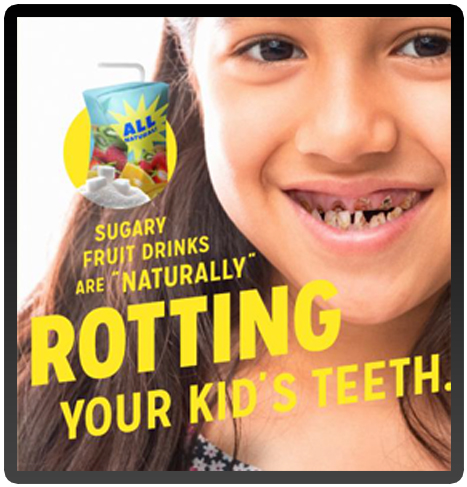
Countermarketing based on anti-smoking campaigns reduces buying of sugary ‘fruit’ drinks for children
University of Washington Prss Release October 28, 2021
Countermarketing based on anti-smoking campaigns reduces buying of sugary ‘fruit’ drinks for children
Jake EllisonUW News
Public health messages such as in the image below — designed to reduce parents’ purchases of sugar-sweetened beverages marketed as fruit drinks or children — convinced a significant percentage of parents to avoid those drinks, according to a study by researchers at the University of Washington and the University of Pennsylvania.

This is an example of a message designed to reduce parents’ spending on sugary beverages. Go to Truth About Fruit Drinks for more countermarketing images and content to share on social media or anywhere.
The UW-led study set out to assess the effect of culturally tailored countermarketing messages on drink choices, similar to stark anti-smoking campaigns, and involved more than 1,600 Latinx parents who participated by joining Facebook groups. Study authors focused on this demographic because Latinx children have a high rate of sugary drink consumption, and the beverage industry intentionally targets the Latinx community, said Dr. James Krieger, lead author and clinical professor of health systems and population health in the UW School of Public Health.
“The negative health effects associated with the consumption of sugary drinks — such as tooth decay or, later in life, diabetes — are disproportionately affecting this community,” Krieger said. “We want these and other kids to be able to avoid developing strong taste preferences for a product that’s ultimately going to harm them.”
To design their study, published Thursday in the American Journal of Public Health, researchers consulted focus groups involving dozens of Latinx parents from across the country to get their perceptions of how marketing works, how they think about what they are buying for their children, as well as how to culturally tailor messages that would resonate in their community.
Sugary Drink Countermarketing Toolkit
Download messages and images for sharing the truth about fruit drinks.
“They know that targeted marketing happens all the time in the digital era, but what really got them was the fact that they were given deceptive information that they felt was leading them to make unhealthy choices on behalf of their kids,” Krieger said.
That industry marketing, Krieger added, led parents to believe fruit drinks are healthy beverages by creating a “halo of health” around the product. Ads, labels, and even online games and cartoons often contain claims about nutrients such as vitamin C and images of healthy kids drinking their products while participating in sports.
With information from those focus groups and the aid of a Latinx marketing firm, the researchers created countermarketing graphics and messages in Spanish and English designed to elicit outrage, fear of the harmful effects on children and other negative emotions. The messages called out specific brands and images, along with describing the adverse effects of these products.
“We looked at anti-tobacco messages and the words and types of images they used,” Krieger said. “We wanted messages that would appeal to folks on an emotional level as well as a cognitive one, because that’s what research shows drives people to make choices.”
The researchers then enrolled 1,628 Latinx parents — predominantly female and from lower-income households — to participate in Facebook groups for six weeks to study the impact of countermessages on those parents’ beverage choices and fruit drink perceptions.
original article


 How to resolve AdBlock issue?
How to resolve AdBlock issue? 